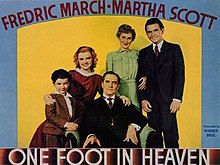This is an old revision of this page, as edited by Onel5969 (talk | contribs) at 16:27, 22 December 2013. The present address (URL) is a permanent link to this revision, which may differ significantly from the current revision.
Revision as of 16:27, 22 December 2013 by Onel5969 (talk | contribs)(diff) ← Previous revision | Latest revision (diff) | Newer revision → (diff) 1941 American film| One Foot in Heaven | |
|---|---|
 original promo poster original promo poster | |
| Directed by | Irving Rapper |
| Written by | Hartzell Spence (book) |
| Screenplay by | Casey Robinson |
| Produced by | Irving Rapper |
| Starring | Fredric March Martha Scott Beulah Bondi Gene Lockhart |
| Cinematography | Charles Rosher |
| Edited by | Warren Low |
| Music by | Max Steiner |
| Distributed by | Warner Bros. Pictures |
| Release date | October 2, 1941 (1941-10-02) |
| Running time | 108 minutes |
| Country | United States |
| Language | English |
One Foot in Heaven is a 1941 American biographical film starring Fredric March, Martha Scott, Beulah Bondi, Gene Lockhart and Elisabeth Fraser.
The movie was adapted by Casey Robinson from the autobiography by Hartzell Spence. It was directed by Irving Rapper.
It was nominated for the Academy Award for Best Picture.
Plot
The film follows the life of minister William Spence (Fredric March) and his family and the various difficulties and people they encounter as they move from parish to parish through the first half of the 20th century. The constant moves prevent the children from developing relationships, which they resent, while the Reverend is just as upset by what he sees as the growing immorality of the 20th Century. As the film progresses Spence’s rigidness, which causes difficulties with both his family and his parishioners is gradually softened, which allows Minister Spence to grow to appreciate the life of a younger generation and how he needs to minister to people, and not just going through rituals and customs. This transition is highlighted in a series of scenes in which Reverend Spence has been preaching against the evils of the American Cinema. He finds out his son (the author of the biography) has been sneaking out to go to the movies, so he agrees to go with his son to view a film. During the film, Spence becomes attracted to the moral theme of the film, and ends up cheering along with the rest of the audience. His next sermon is based on the moral lesson from the film.
Cast
- Fredric March as William Spence
- Martha Scott as Hope Morris Spence
- Beulah Bondi as Mrs. Lydia Sandow
- Gene Lockhart as Preston Thurston
- Elisabeth Fraser as Eileen Spence at Age 17
- Harry Davenport as Elias Samson
- Laura Hope Crews as Mrs. Preston Thurston
- Grant Mitchell as Clayton Potter
- Moroni Olsen as Dr. John Romer
- Frankie Thomas as Hartzell Spence at Age 18
- Jerome Cowan as Dr. Horrigan
- Ernest Cossart as Mr. John E. Morris
- Nana Bryant as Mrs. Morris
- Carlotta Jelm as Eileen Spence at Age 11
- Peter Caldwell as Hartzell Spence at Age 10
Reception
The film was received quite warmly both theatrically and critically, the New York Times calling it "a Fine and Human Story of a Minister's Life".
Notes
Olivia de Havilland was originally scheduled for the role of Hope Spence, but was moved over to star opposite Errol Flynn in They Died With Their Boots On.
Raymond Massey was Hartzell Spence's choice to play his father, while his mother preferred Fredric March. The studio's decision to cast March was done independently of the family's wishes.
The Reverend Norman Vincent Peale was hired as technical advisor on the film.
The film which Spence goes to see with Hartzell is William S. Hart's 1917 Western, "The Silent Man". At the Hollywood premiere of the film, Hart was a guest of honor.
In an uncredited roll, Gig Young has one of his first on-screen performances as a Groom asking for a dog license.
References
- http://www.amazon.com/Foot-Heaven-Life-Practical-Parson/dp/B000OO3OAA/ref=sr_1_1?s=books&ie=UTF8&qid=1387717765&sr=1-1
- http://articles.latimes.com/2001/may/28/local/me-3661
- "The 14th Academy Awards".
- "The New York Times".
- "Variety".
- "Turner Classic Movies".
- "Turner Classic Movies".
- "Turner Classic Movies".
- "Turner Classic Movies".
- "TV Guide".
External links
- One Foot in Heaven at IMDb
- One Foot in Heaven at the TCM Movie Database
- Template:Amg movie
- One Foot in Heaven at the AFI Catalog of Feature Films
| Films directed by Irving Rapper | |
|---|---|
|
This article about a biographical film is a stub. You can help Misplaced Pages by expanding it. |